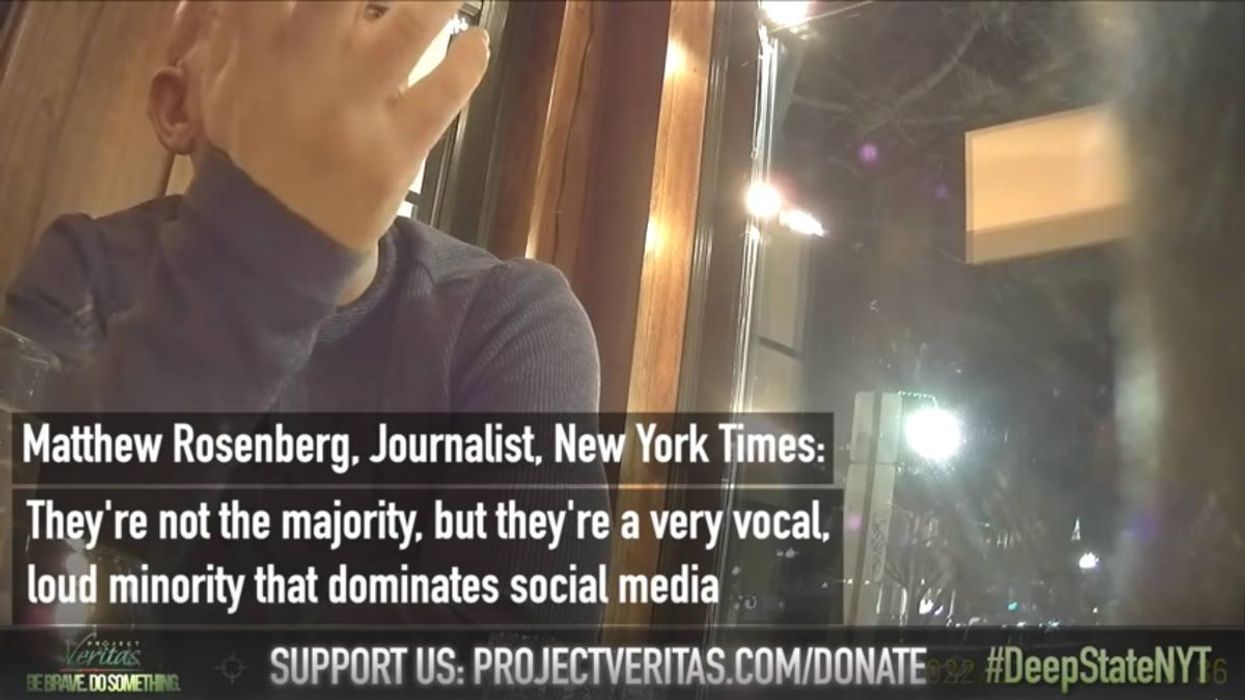
Image source: YouTube screenshot

Pulitzer Prize-winning journalist Matthew Rosenberg described internal divisions at the New York Times between some of his "reasonable" colleagues and younger, more ideologically leftist employees in a new video released by Project Veritas Wednesday.
The video is part two of a series featuring Rosenberg, a national security correspondent for the paper. In the first part released earlier this week, Rosenberg criticized the left's response to the Jan. 6, 2021, riot at the U.S. Capitol and mocked some of his colleagues for acting "traumatized" by the events of that day.
In part two of the hidden camera sting, he elaborated on "a real internal tug of war" at the Times between "reasonable people and some of the crazier leftist s**t that's worked its way in there."
“They're not the majority, but they're very vocal, loud minority that dominate social media and, therefore, has just hugely outsized influence," Rosenberg said of some of his colleagues.
NYT Reporter: CIA/NSA Sources Involved With Trump “Pee Tape” & "Leftist sh*t" At The Timeswww.youtube.com
Rosenberg did not identify these younger colleagues by name, but he did elaborate on how the broader American culture has impacted employees at his company, which in turn has shaped how the paper covers news stories and responds to controversies.
"So, if our broader culture is in a moment where everybody thinks they know best, that's gonna end up reflecting itself. We're part of that culture," he said in one clip. "I don't think they consciously are aware of these opinions. Like, you know, you inhabit the world you live in. This is a world right now where everybody seems to think they have the answer to everything."
In another clip he described some of the people who work for the Times as "very high-achieving, very neurotic people."
"And you can see it in how they approach the world and why they get freaked out over things. Whereas, like, the rest of us are like, 'I'm gonna go on with my life,'" he added.
The generational clash Rosenberg described has at times been seen in public, such as with the controversial firing of veteran science reporter Donald McNeil Jr., who angered younger staff by using a racial slur in a discussion with students on an educational trip to Peru in 2019. Former Times opinion writer Bari Weiss has also publicly criticized her former colleagues at the paper, whom she accused of "bullying" and creating a "hostile work environment" for those who do not conform to their leftist ideology.
When the undercover Project Veritas journalist asked about how Times articles are "skewed" by the culture at the paper, Rosenberg stated that "it's become a real problem."
"It just gets worse and worse. We have a lot of younger colleagues who don't seem to get what we do," he said.
"I mean, there are people in the company who know, there's like a — they are not necessarily the reporters, but we do have younger colleagues who like — if you come at us from a fancy Ivy League school, been in private school your whole life, there's a certain amount of indoctrination that's going on. It's subtle, but you don't realize it. And like, like the mere concept of microaggression, somebody that's — only ex — like, among normal people they don't think about it at all," Rosenberg explained.
"People have to think about it," he quickly added. "It's a subject of debate, but among a certain kind of academic, people raise that kind of question, it's just a given fact of life. And I'm just like, I don't buy, like, I don't think it is actually. But like, that kind of worldview works its way in, it's subtle but it's there. And you're still like, 'God, what the f*** are we doing here?'"
In another clip, he says that social media has played a large role in how younger people at the paper behave.
"So, you've got a small group of these elite that — basically they're bullies. Kind of privileged. I think this is where the social media piece comes into it," Rosenberg explained. "Personalities that would've been considered toxic in most places, that would've been shunned, kind of get elevated by social media because you lose the context of what they've done."
"If somebody is behaving the way they behave on Twitter in an office of 40 people, there are gonna be social repercussions for that. There's not on Twitter. You've got a hallelujah chorus cheering you on," he said.
He added, "Usually there are good-faith talks of sexism, racism, whatever, but the bad-faith stuff can be really hard to sort out in that situation."
Asked if the Times is intentionally bending to please a left-wing audience for "viewers or subscribers," Rosenberg shared that in his view, the paper is actually "alienating most subscribers."
"Most of our readership, most of our subscribers are prosperous. Most of them probably don't want to hear that they're awful people all the time," he said. "And the really woke kind of racial stuff really bugs them. They don't think a world in which everything is defined by their racial identity is a good idea."